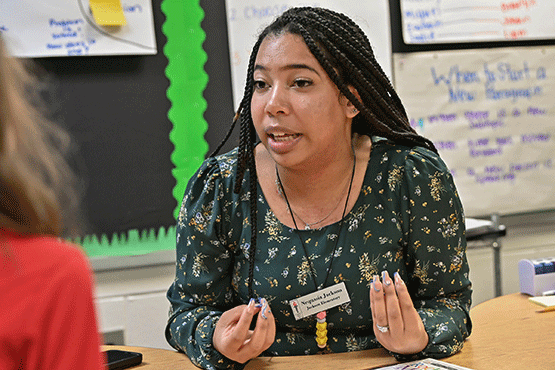news
Georgia Gwinnett College education fellowship is a win-win for students, schools

When it comes to professions that make a real impact on the world, it’s hard to top teaching. Everyone has that teacher who lit the creative spark, introduced the new idea, or gave the encouragement that changed the course of their life.
Sadly, the job of teaching has apparently not been giving educators the same inspiration. Teachers have been evacuating the profession in droves, and enrollment in teacher training programs has been declining. Two years of lockdowns during the COVID-19 pandemic only exacerbated the problem. A recent study by Forbes showed anywhere from 25 to 54 percent of the nation’s educators are considering leaving their jobs.
The School of Education at Georgia Gwinnett College (GGC) launched a fellowship pilot program this year to change that. The heart of the program is centered around the essence of teaching – relationships.
To be effective, teachers must understand their students’ needs and passions, and the students must know and respect their teachers. This can’t happen in a day or a week, and the architects of GGC’s fellowship program understood that. That’s why they created a program that takes undergraduate teaching students and places them in elementary, middle and high school classrooms around Gwinnett County for an entire year. The fellowship then goes a step further than most student teaching programs, as the regular teacher steps aside into a mentorship role and the student teacher is given control of the classroom and full-time pay.
“Selling it to schools that have a shortage of teachers is sometimes hard because you’re saying you want to remove a good teacher from the classroom to mentor these college students,” said Anita Anderson, director of the program and interim chair of field and clinical experiences and Education Partnerships for GGC’s School of Education. “But in the end, they’re getting two for one.”
The idea of placing undergrads in front of real classrooms for a year came about as Anderson and her team worked with Gwinnett County Public Schools to determine how they could effectively and quickly staff classrooms to meet the district's needs. They picked seven students for the pilot program and placed them in three district schools: Peachtree Elementary School, Jackson Elementary School and Meadowcreek High School. The seven still had to complete their regular college coursework while working in their classrooms full-time, so it was no small commitment.
“This program is definitely not for the weak. It is a lot of work, and you really have to love teaching and love the kids to get through it,” said Nequasia Jackson, a senior studying Elementary Education who was placed in a Jackson Elementary School classroom for the year with mentor teacher Nicole Hollum. “But, if I could go back knowing what I know now about the program, I would definitely still apply. I have learned more in the short time I have been in the program than anywhere else and that has set me up for my future in this career.”
Also participating in the fellowship is Nick Williams, a senior majoring in history and minoring in religious studies. Williams placed in a classroom in Meadowcreek High School for the year with mentor teacher Harvey Gratz.
“For me, the most appealing initial aspect of the fellowship program was the chance to get paid while performing my student teaching. But beyond that, on a deeper level, the opportunity to bring to life my own version of an idealistic classroom environment was one I could not pass up,” said Williams. “By far, my favorite thing about teaching is building relationships with my students. Having a classroom environment where the students actually want to come to your class is key. Without those foundational relationships, learning will fail to take place because the students will have resistance or mistrust with their teacher.”
Anderson said the fellowship is proving beneficial not just to the student teachers, but to the veteran teachers who serve as mentors and the school system itself, as the program also serves as a professional development opportunity.
“A big piece of this is retention,” said Anderson. “We want to give the fellowship teachers support so they feel confident and make them a part of the school community, so they want to stay. GCPS can use this program as a stepping stone for these mentor teachers to become full-time instructional coaches, or simply to stay in the mentoring teacher role as the program grows.”
The first iteration of the fellowship has been so successful that Anderson and her team plan to triple the program size next year, placing 20 to 24 GGC undergraduates into Gwinnett County classrooms. Jackson and Williams both say they would recommend the program to any GGC student who appreciates a challenge and has a passion for teaching.
“Honestly, it is truly an honor to do what I love and have always loved a year early,” said Jackson. “I was working and doing school at the same time anyway, so it wasn’t an option for me to stop working to student teach full time, so when I heard about this program, it was the answer to my problems. I appreciate GGC for even allowing me to be in this position to begin with.”
“I would most definitely recommend this program to other GGC students,” said Williams. “If you’re passionate about teaching and want to get a leg up on the competition, this is the program for you.”
